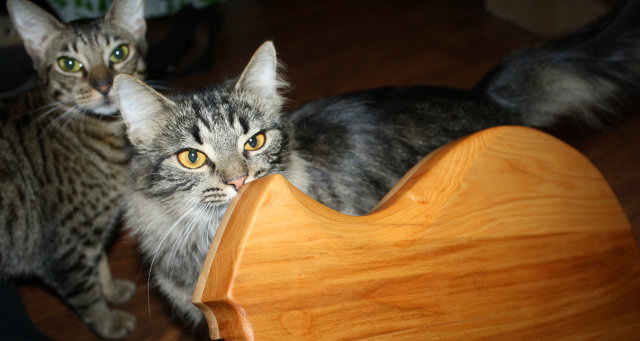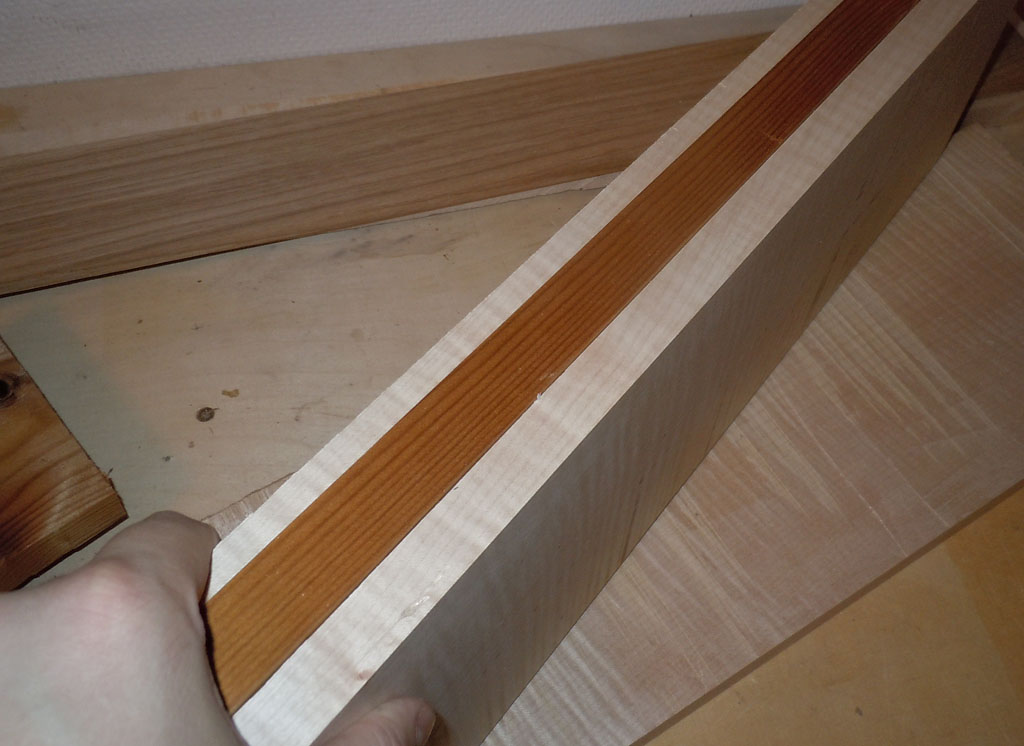Roasted Wood
-
Eugene Coldrick
- Posts: 9
- Joined: Thu Feb 02, 2012 5:40 pm
Roasted Wood
Greetings: I have come across a local person selling wood for lutherie. (Something rare in Nova Scotia) He has some curly maple and some more exotic woods. He states that all his wood is "roasted and stabilized". I have not encountered those terms before, perhaps for a reason. Any thoughts on it's usability?
Thanks in advance for any and all opinions.
Namaste
Eugene
Thanks in advance for any and all opinions.
Namaste
Eugene
-
David Malicky
- Posts: 60
- Joined: Sat Jan 07, 2012 11:11 pm
- Location: San Diego, CA
Re: Roasted Wood
Sounds like "cooked" wood, which is common practice in lutherie. Taylor cooks ~all their wood -- 200F for tops, 270F for most everything else. 200F for 2 hours seems pretty common for tops. The idea is to 'set' the resins and remove all moisture, which preshrinks the wood so it is more stable. There is evidence for the effect in wood samples, but whether guitars in-service actually benefit is less clear. Above 300F can degrade strength and stiffness a little; so long as not that high, the wood is either more stable or no different. A few discussions...
http://luthiersforum.com/forum/viewtopi ... 01&t=35707
http://luthiersforum.com/forum/viewtopi ... 01&t=22823
http://luthiersforum.com/forum/viewtopi ... 01&t=35707
http://luthiersforum.com/forum/viewtopi ... 01&t=22823
-
David King
- Posts: 2690
- Joined: Sat Jan 07, 2012 10:01 pm
- Location: Portland, OR
- Contact:
Re: Roasted Wood
Well it's "Cooked" but not in the same way David is thinking.
Lots of descriptive terms but "roasted" seems to be the standard term these days. Temps are in the 400-450 degree range and the kiln is oxygen starved to keep the wood from self-combusting. The fellow I know of in NS has been doing it for a while and has got the process down. Other purveyors have had their troubles, mostly cracking and scorching. The wood is brittle but it sounds good does seem to stay stable in spite of changes in moisture. Some have experienced difficulties with glue adhesion.
Lots of descriptive terms but "roasted" seems to be the standard term these days. Temps are in the 400-450 degree range and the kiln is oxygen starved to keep the wood from self-combusting. The fellow I know of in NS has been doing it for a while and has got the process down. Other purveyors have had their troubles, mostly cracking and scorching. The wood is brittle but it sounds good does seem to stay stable in spite of changes in moisture. Some have experienced difficulties with glue adhesion.
-
Eugene Coldrick
- Posts: 9
- Joined: Thu Feb 02, 2012 5:40 pm
Re: Roasted Wood
I very much appreciate the information. I now feel more comfortable with the idea. I checked out the links, Dave M. Cool info. Dave K.; is the person you know in NS in the Fall River area of Halifax County?
I forgot how much I missed this place. Though I was mostly a lurker on the old forum.
Thanks again.
Eugene Coldrick
Noel, Hants County.
I forgot how much I missed this place. Though I was mostly a lurker on the old forum.
Thanks again.
Eugene Coldrick
Noel, Hants County.
-
David Malicky
- Posts: 60
- Joined: Sat Jan 07, 2012 11:11 pm
- Location: San Diego, CA
Re: Roasted Wood
Oh, yes, that's something else entirely. The wood science folks call that "heat treated" -- sounds like kiln operators prefer "roasted"? Lots of scientific studies show it is much less hygroscopic, ~50% less. Usually, it's even more dimensionally stable for the little moisture it does take in. Great for outdoor apps--often the intent. But like David said, it's typically brittle and harder to glue to (non-water-based glues are best). There are many processes (atmospheres may be vacuum or pressurized, steam, nitrogen...), but most also produce losses in mechanical properties and mass. Damping is usually less (better). Color darkens. The simpler/older processes make weak wood. The better ones seem to be coming from Europe (Plato-wood, Thermo-wood.)
A few reviews--
http://www.ncsu.edu/bioresources/BioRes ... ev_367.pdf
http://thermotreatedwood.com/Worldwide/review_heat.pdf
A few reviews--
http://www.ncsu.edu/bioresources/BioRes ... ev_367.pdf
http://thermotreatedwood.com/Worldwide/review_heat.pdf
-
Tristan Williams
- Posts: 100
- Joined: Thu Feb 02, 2012 11:10 am
- Location: Espoo, Finland
Re: Roasted Wood
Here in Finland Thermo-wood is available at all the big box stores. I've been tempted for a while now to build a solid body from thermo-treated pine as it takes on a beautiful rich golden brown colour. I've used thermo-treated alder (its sold dirt cheap for sauna construction here) a couple of times now and it works nicely and looks great with a little Tru-Oil:

The resulting guitar - plain maple drop top, heat treated alder back - sounded fantastic. I'll definitely use it again.
I've got some thermo-treated aspen at home and that looks really nice, especially since much of it has some light figuring that gives the grain an iridescent appearance, however its very "fluffy" and a bit annoying to work. It smells fantastic, though!
I'd like to get my hands on some darkly thermo-treated birch for fingerboards, but I haven't been able to find a source for it yet.

The resulting guitar - plain maple drop top, heat treated alder back - sounded fantastic. I'll definitely use it again.
I've got some thermo-treated aspen at home and that looks really nice, especially since much of it has some light figuring that gives the grain an iridescent appearance, however its very "fluffy" and a bit annoying to work. It smells fantastic, though!
I'd like to get my hands on some darkly thermo-treated birch for fingerboards, but I haven't been able to find a source for it yet.
-
Eugene Coldrick
- Posts: 9
- Joined: Thu Feb 02, 2012 5:40 pm
Re: Roasted Wood
I too love the smell of aspen, or poplar. Not much density. It's known here for growing fast, then blowing down in a windstorm. I may try the roasted maple, if I can find a piece bit enough for a cello.
-
David Malicky
- Posts: 60
- Joined: Sat Jan 07, 2012 11:11 pm
- Location: San Diego, CA
Re: Roasted Wood
Tristan, very nice--I wish we had Thermo-wood in the US big box stores. There is some acetylated wood sold here (Accoya, from the UK), which studies show has lower damping and hygroscopicity (what a word... but that's what they call it). I need to drive to LA to see it, though.
-
Tristan Williams
- Posts: 100
- Joined: Thu Feb 02, 2012 11:10 am
- Location: Espoo, Finland
Re: Roasted Wood
Cross-post from my local challenge build. I decided to do a maple/roasted pine/maple sandwich for the body. I used some offcuts from roasted pine decking, planed all the grooves off and here is how it looks sandwiched:

It is called "Thermo-D" pine, which means it is roasted quite dark. This stabilises it dramatically, enough for use in environments with radical humidity shifts like saunas and outdoors. There was some radiata pine at the big box store which was roasted even darker, I might use that for another project, but it was expensive enough that it would have blown my budget for the $100 challenge.
It is called "Thermo-D" pine, which means it is roasted quite dark. This stabilises it dramatically, enough for use in environments with radical humidity shifts like saunas and outdoors. There was some radiata pine at the big box store which was roasted even darker, I might use that for another project, but it was expensive enough that it would have blown my budget for the $100 challenge.
